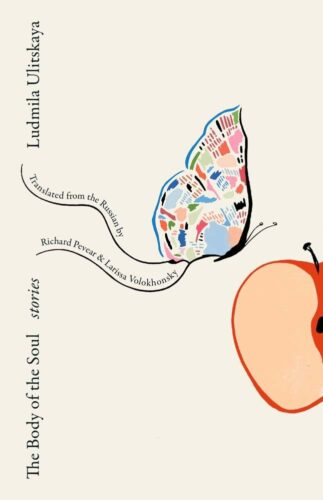Book Review: “The Body of the Soul” — Life is a Game Worth Playing
By Thomas Filbin
Ludmila Ulitskaya’s stories are fatalistic in spirit, but not morose.
The Body of the Soul: Stories by Ludmila Ulitskaya. Translated by Richard Pevear and Larissa Volokhonsky. Yale University Press, 153 pp. $18.

A stereotypical aphorism about Russian literature might be, “Say it with melancholy or not at all.” Tolstoi, Dostoevsky, and Turgenev never sought to be lighthearted storytellers, but drew from their bottomless and astonishing reservoirs of observation, which could be pitiless. Ludmila Ulitskaya follows those bloodlines, but I would say gravity rather than melancholy would be a better word to describe her work. Her collection of short stories plumbs one universal theme: humanity surviving against all odds, despite itself.
Born in 1943, Ulitskaya experienced the weight of Russian totalitarianism from 1970 on, after she was fired from her government job because she was caught distributing samizdat literature. A late starter to the literary life, her first short fiction was published at age 47. Since then she has written novels and short stories that have been published in 25 languages and have won many awards. In 2006 she was nominated for the Man Booker Prize. The fruits of a late bloomer, her work has retained a cutting edge and readability despite its seriousness, understandable given the politically alarming times that Russian writers have — and will — live through. This particular collection is translated by veteran Russian translators Richard Pevear and Larissa Volokhonsky (their most recent effort is a paperback edition of War and Peace), so the odds are that the English prose here reflects Ulitskaya’s true voice — neither harsh nor saccharine, just honest.
As a collection, the stories in The Body of the Soul are not connected by plot and personae. The drama in each turns out to be a confrontation with the immutability of fate shaped by an ironic admiration for the weary persistence of human nature. In “Alisa Buys Death,” a young woman named Alisa, half-Baltic, half-Polish, survives a crazy mother, Martha, who was always in love, “…passionately in love, to the point of the psych wards. She was always ready to bring to her next lover’s feet everything she owned….” Martha eventually commits suicide by throwing herself under a train, but not before a visit to the hairdresser and manicurist. Alisa vows never to be such a self-destructive slave and plaything of a man. After a long career and retirement, she falls in love with a widower, a doctor, whom she had asked for sufficient pills to kill herself when the time came when living became useless. But this turn in her fortune, a late middle-age marriage, turns out to reverse all she had held as a life rule — not to love, not to live longer than she felt meaningful.
“Two Together” is a story in praise of physical love. Valentin Ivanovich, who has been married twice and is “…a lover of fresh relationships and an inveterate enemy of fidelity…” finds himself obsessed with his sexual desire for Gulya, a Tartar girl. In the first year of their affair “…he did not realize that his body and soul were destined for the monogamy he despised since his youth. He came to this realization gradually.” The descriptions of the pair’s physical interactions are nuanced: for Valentin, the feeling of someone’s breath or touch or skin is indescribable. In a sudden flash forward, Gulya has become ill; she is bedridden but Valentin is just as obsessed with her body as ever. But now he has become her caregiver. He tenderly recalls the old days as he tends to her, caressing a ribbon that once graced her hair. This very short story, a vignette really, stands as a touchingly philosophical meditation on the enduring significance of the bodily engagement between two people.

Author Ludmila Ulitskaya — her stories are fatalistic but not morose. Photo: Basso Cannarsa
“The Autopsy” dramatizes the reflective state of mind of a pathologist. “Kogan loved his atrocious work…,” the story begins, and notes that his first wife, a gynecologist, said only a pathological type can choose that profession. The protagonist is a pensive man, wondering as he cuts and measures, whether a dead man had “… died in his allotted time, or had failed to live to the limit set him by nature.” He does not like to dissect children or young women because of the absurdity of such reality: it contradicts existence that they are on his table at all. Tumors of different types and car accidents are common and predictable. But the suicide of a young woman who had undiagnosed leukemia perplexes Kogan. Did she unknowingly take an easier way out rather than learn of what would have been a slow death? Does that offer any consolation?
The endless parade of corpses takes its toll. Kogan sleeps apart from his wife in a separate room. He thinks about his two adult children, who live far away, but it is clear that the world of the dead has assumed far more imaginative significance in his own life than living itself.
Other stories involve older characters who have found ways to survive divorces or deal with the painful vicissitudes of death. One woman finds happiness in growing apples; a mother with a seemingly ‘slow’ son suffers from the loneliness and poverty that comes with being pushed to the social margins. The son, however, becomes fascinated with photography and becomes good at it, good enough to make a living. Real life is unmanageable but depicting it was not.
Ulitskaya’s stories are fatalistic in spirit, but not morose. The author is now just past 80, so it is understandable that the topics of death, decay, and disappointment predominate. But, as you read these pieces, there are no nihilistic suggestions that — no matter how dire the circumstances and trials — the game of life was not worth playing. Perhaps the overriding message in Ulitskaya’s fiction is that feeling alive, even if it means enduring pain or anguish, is a greater blessing than embracing death in life.
Thomas Filbin is a book critic whose work has appeared in The New York Times Book Review, The Boston Sunday Globe, and The Hudson Review. He teaches writing at Suffolk University in Boston.
Tagged: Ludmila Ulitskaya, Russian literature, feminism, short stories
